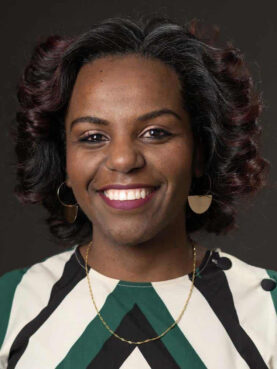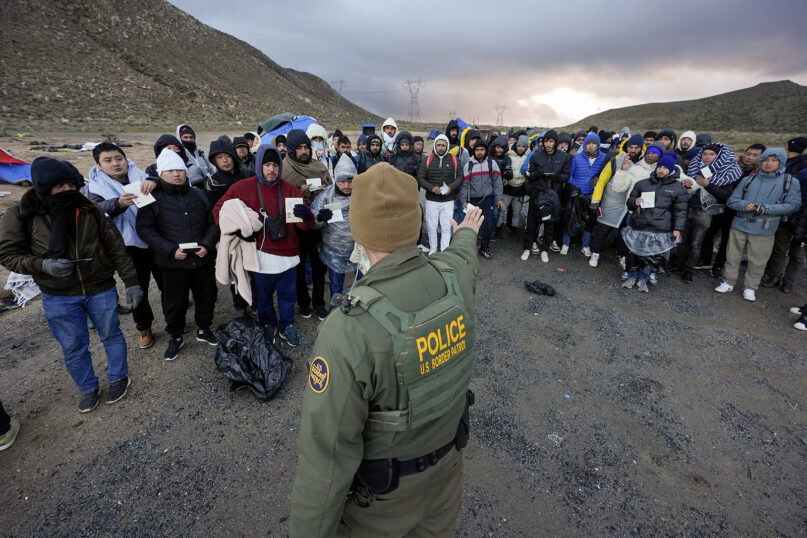(RNS) — While congressional Democrats are chiding Republican senators for walking away from a compromise immigration bill that restricts asylum, faith-based agencies that work with refugees and asylum-seekers expressed alarm in recent days about provisions of the bill and the turn that the conversation about immigration has taken.
“You’re not going to solve anything at the border when you start from the premise that migration is a threat to our country or that migrants are people to be feared,” said Dylan Corbett, executive director of Hope Border Institute, a Catholic organization that supports migrants across the El Paso, Texas, and Ciudad Juárez, Mexico, border.
The wide-ranging bill, which came together after months of bipartisan negotiations, introduced a “border emergency authority” under which, when a certain threshold of migrant encounters is reached, most migrants crossing unlawfully would automatically be expelled rather than be allowed to seek asylum.
The bill also raised the legal standard for credible fear of persecution in migrants’ initial asylum screening and accelerated the timeline for asylum processing.
On Wednesday (Feb. 7), most Senate Republicans voted against the bill, with some claiming the problem is President Joe Biden’s failure to enforce existing laws. By the time of the vote it was clear the mood for compromise had disappeared, and any hopes of moving forward on the measure — negotiated under the leadership of Oklahoma Republican Sen. James Lankford, Arizona independent Sen. Kyrsten Sinema and Connecticut Democratic Sen. Chris Murphy — had fallen apart.
Murphy and other Democrats have accused their GOP counterparts of folding to pressure from former President Donald Trump, who has argued that the bill would help Democrats in the November election.

HIAS CEO Mark Hetfield. (Photo by Ralph Alswang)
But even some prominent Democrats, such as California Sen. Alex Padilla, said the bill had “missed the mark.” In a statement Sunday, Padilla, the chair of the Senate Judiciary Subcommittee on Immigration, Citizenship and Border Safety, called portions of the bill “a new version of a failed Trump-era immigration policy,” highlighting that negotiations had excluded border-state Democrats and the Congressional Hispanic Caucus.
Mark Hetfield, president and CEO of the Jewish humanitarian group HIAS, one of the six faith-based agencies contracted to resettle refugees and asylum-seekers, called the bill “false advertising.”
“It’s being touted as solving our border problems. It would not do that at all because it ignores the real problems that are causing the system to rot,” Hetfield said, adding that the bill “creates new problems.”
Hetfield said that the “mess” at the border and in the asylum system is caused by an immigration system that hasn’t been reformed since the 1980s, and he called for comprehensive immigration reform. “There are very few ways for people to get into this country other than by applying for asylum, so it overburdens the asylum system,” he said.
The Hope Border Institute’s Corbett agreed. “Legal migration is what will fix the situation at the border,” he said.
While he disagreed with the premise of a “crisis at the border,” Corbett said, “the asylum system really is at saturation point,” adding that more case officers and immigration judges are needed.
Krish O’Mara Vignarajah, president and CEO of Global Refuge (formerly Lutheran Immigration and Refugee Service), also argued that any reform needed to expand legal pathways to immigration. “As our nation struggles with low birthrates and crippling labor shortages, we need to leverage smart immigration policy to meet our economic needs without abandoning our legal and moral obligations to people seeking refuge,” she wrote.

Aerlande Wontamo. (Photo courtesy of World Relief)
Aerlande Wontamo, senior vice president of U.S. programs for World Relief, the humanitarian arm of the National Association of Evangelicals, said, “We have long dreamed of a comprehensive immigration reform and are grateful for the good faith efforts by a Republican and a Democrat representative.”
Wontamo, an immigrant to the U.S. who grew up as an Ethiopian refugee in Kenya, said that she feels “discouraged” by Congress’ polarization and that a bipartisan plan was shot down so quickly.
Wontamo counted among the bill’s positive provisions its increased capacity for asylum adjudication, its offer of immediate work authorizations for those who have passed an initial asylum screening, its additional funding for refugee resettlement and 50,000 new annual family and employer-based immigrant visas.
But she was concerned, she said, with the border emergency authority and that the bill increased capacity for detaining immigrants. It also worried World Relief that the measure omitted a path to citizenship for those known as “Dreamers” — as people covered by the Deferred Action for Childhood Arrivals program are sometimes called — and other undocumented immigrants.
As the bill failed, advocates noted the Democrats’ shift in their long-standing positions on immigration.

Dylan Corbett. (Courtesy photo)
Corbett recalled Biden’s criticism in his 2020 presidential campaign of the Trump administration’s wall on the southern border and Biden’s promise to restore access to asylum. “It’s shocking that the president has really reneged on those commitments and is agreeing to something that we really know is counterproductive,” Corbett said.
Corbett said it’s been clear as enforcement tactics have been tried “over and over” that they don’t work in isolation. “It’s impossible to shut down the border,” he said.
While many observers have noted the Democratic Party’s apparent willingness to yield on immigration, Hetfield focused on the Republicans’ significant change in stance over the past decades. “At one time, the Republican Party was the party of immigration because they realized it’s in our economic interest to promote a fairly generous immigration policy” for both immigrants and employers looking for labor.
Some faith-based organizations expressed support for the bill. The Ethics & Religious Liberty Commission of the Southern Baptist Convention, a Washington- and Nashville-based office, described the bill as “in line” with the 2023 Southern Baptist resolution “On Wisely Engaging Immigration.”
“In addition to providing resources and policy changes that would make the border more secure, the proposal retains key narrow avenues for those with valid asylum claims to make their case,” Hannah Daniel, ERLC’s director of public policy, wrote on Tuesday.
Even with immigration taking a contentious place in election-year conversations, Corbett has hope. “It looks like this bill is going to go nowhere,” he said before the vote. “Hopefully, we get a second bite at the apple and are able to take the lessons learned and focus on solutions.”
As the bill flamed out, Matthew Soerens, World Relief’s vice president of advocacy and policy, said the organization is “hoping and praying” for a second shot at passing a key World Relief priority in the bill, a path to permanent legal status for Afghans paroled in the U.S. after the 2021 U.S. withdrawal.
Hetfield said HIAS also strongly supports the bill’s provisions for Afghans. “There is literally no rational basis for opposing the Afghan Adjustment Act,” he said, noting that HIAS has advocated for it since 2021. “If we can’t get that through, we can’t get anything through.”





